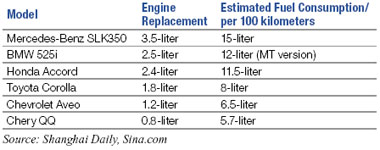The government's latest move to raise gasoline and diesel prices has touched a sensitive nerve with car buyers.
Many Chinese planning to buy their first car find the 18-percent fuel increase has given them second thoughts about their purchase, which may dampen car sales.
But given the small marginal impact on users and the low market penetration of cars, industry analysts agree that the speedy growth in China's auto industry is irreversible in the long term.
And the price rise is also seen as giving a boost to smaller-engined cars which have better fuel consumption.

From last Friday, the retail price of gasoline rose by 0.8 yuan (12 US cents) per liter while that of diesel added 0.92 yuan per liter - the second price hike since last October.
"We expect volume growth of low-end private vehicle sales to slow down more than in the overall industry because fuel cost is a major consideration for individual buyers," said Jane Ye, an Asia-Pacific analyst of the auto sector at Cazenove Asia Ltd.
"We don't expect a meaningful impact on sales of Japanese brands with good fuel efficiency," she said, adding that rising fuel prices will also have far less impact on commercial vehicle sales.
A Fitch Ratings report also showed sales of sport-utility vehicles in China, especially cheaper models, may slow as the price increase will push motorists toward vehicles with better fuel consumption.
Even so, analysts fear that dearer fuel may drag down overall vehicle sales in China, the world's second-largest auto market. However, because so few Chinese have private cars, there is plenty of room for growth in the long term, they say.
By the end of last year, there were 36 million privately owned cars in China, a 20.8 percent rise since the previous year. For every 1,000 people there are 50 privately owned vehicles, far lower than the global average of 120 cars, and 750 cars in the United States market.
"In my opinion, there may be some potential car buyers discouraged by the rising gasoline prices, but speaking overall, it will have a low impact in passenger vehicle sales in the short term," said Klaus Paur, regional director of the automotive division at TNS China.